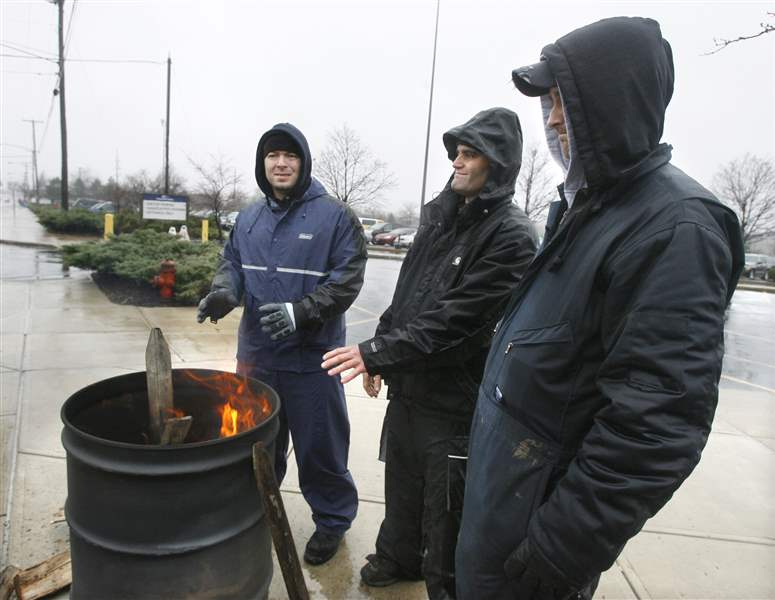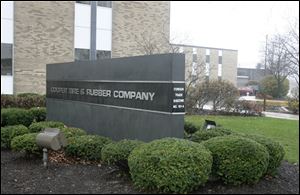
Cooper Tire letter defends rejected pact's pay offer
Locked-out workers stand firm
12/1/2011
Locked-out Cooper Tire & Rubber workers, from left, Josh Smith, Don Brink, and Tim Haley try to stay warm outside the Findlay plant. Talks between the union and management continue.
THE BLADE/DAVE ZAPOTOSKY
Buy This Image

Locked-out Cooper Tire & Rubber workers, from left, Josh Smith, Don Brink, and Tim Haley try to stay warm outside the Findlay plant. Talks between the union and management continue.
FINDLAY -- Negotiations continued between Cooper Tire & Rubber Co. and its union work force here Wednesday, though it was unknown how productive those talks were in getting the 1,050 employees who are locked out back to work.
Union leadership contends the rejected contract contained several concessions, including steep pay cuts for some workers, and would limit the future earnings of new employees or current employees who switched jobs within the plant.
Company officials have been largely silent, ignoring multiple requests for comment by The Blade.
However, late Tuesday, the company sent an open letter to Findlay-area residents, which was posted on the Web site of the Findlay Courier newspaper.
In that, Chris Ostrander, Cooper Tire's president of North American Tire Operations, said the offer would have preserved earning for 85 percent of the work force and would increase the earning potential for the remainder.
Mr. Ostrander wrote other terms included a $2,500 signing bonus offer to ratify the agreement; $1,000 inflation protection payments for all union employees in 2013 and 2014; and a $4-an-hour increase for the plant's skilled-trade workers.
In return, the contract would have reduced vacation accrual for new hires and reduced the maximum amount of vacation for employees by one week.
It also would have revamped the plant's production standards and job classifications, lowering the pay of some positions to what Cooper considered a fair market price.
Current employees who stay in their current job would stay at the old rate, but new hires or those bidding into the reclassified jobs would be paid less. There were also some changes to the retirement and health-care plans.
"These productivity enhancements have been labeled by the union as concessionary, but will better enable Cooper to compete in this ultracompetetive environment," Mr. Ostrander wrote.
Teresa Brown, a plant employee and Women of Steel Coordinator for local United Steelworkers 207, called the letter bogus. "He's making us out like we're greedy and we want the world," she said.
"We all want Cooper Tire to be profitable, because if they're not, we're not going to get anything. And they were profitable. All we want is our share."

Cooper officials have said they intend to hire replacement workers, but it was unclear if tires were being made.
Many of the locked-out employees settled in around fire barrels Wednesday to picket outside the company's headquarters and manufacturing plant.
"I'll stay out here until they give us a good contract. However long that's going to take," employee John Sizemore said. "We want to work now."
The union, which voted down a proposed contract 2-1 over the weekend, wanted to continue working under the expired contract while the two sides hammered out a new agreement. But the company, concerned with the possibility of a concurrent strike at its plants in Findlay and Texarkana, Ark., told union officials they refuse to let negotiations go on indefinitely.
Cooper Tire locked out the union Monday. The previous contract expired Oct. 31.
Cooper Tire is the fourth-largest tire producer in the United States. Workers said the Findlay plant normally turns out about 20,000 tires a day, most of which are for light passenger trucks.
It was unclear if any tires were being made Wednesday. The company has said it intends to hire temporary workers.
Many union members are upset that executive pay has increased significantly since workers gave what amounted to $30 million in concessions in the last contract.
Cooper Chief Executive Officer Roy V. Armes was paid a total compensation of $4.7 million last year, up from $2.8 million in 2008.
Contact Tyrel Linkhorn at: tlinkhorn@theblade.com or 419-724-6134.